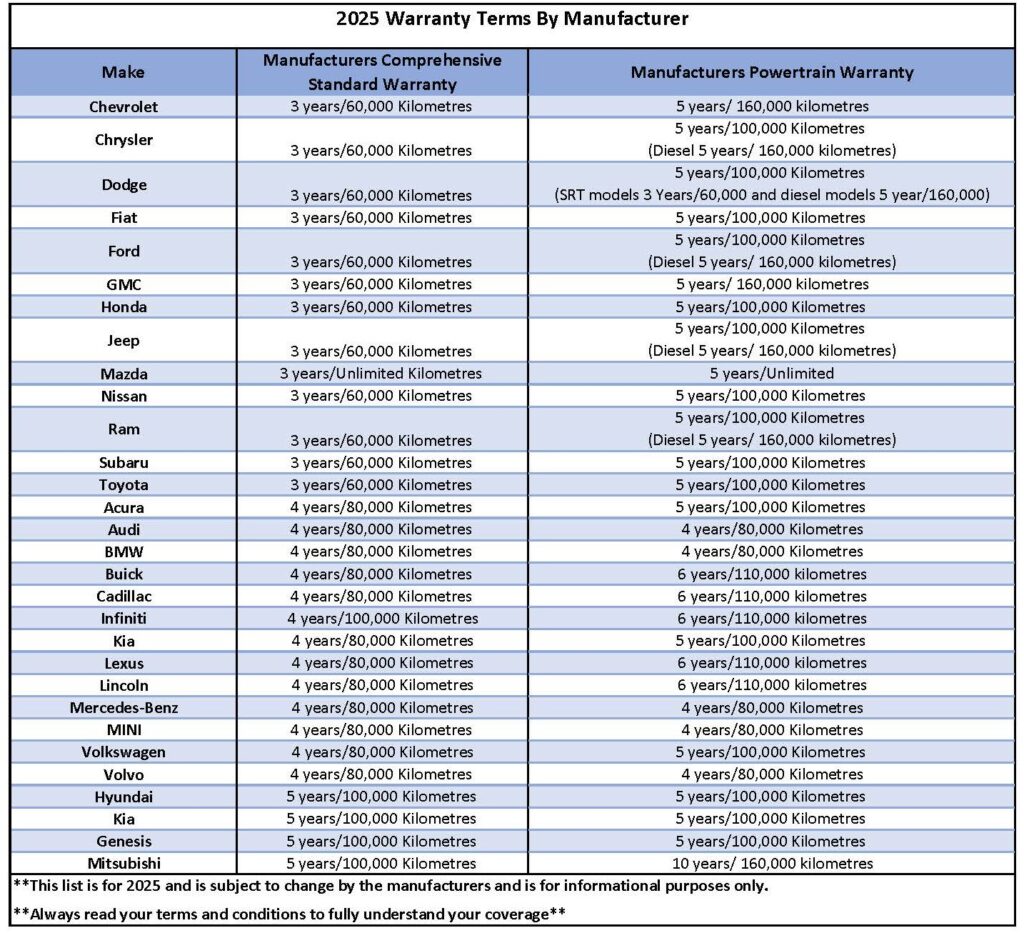Which Cars Have The Best Car Warranty?
When shopping for your next new or used vehicle, you’ll want to know not just how it drives, but which cars offer the best car warranty. After all, a strong warranty can save you thousands in repair costs and give you peace of mind.
All new cars, trucks, and SUVs come with comprehensive and powertrain warranties. Most comprehensive manufacturer warranties are 3 years/60,000 km or 4 years/80,000 km, with powertrain coverage generally being longer. What’s the difference between comprehensive and powertrain?
| Comprehensive Warranty | Powertrain Warranty |
| · Covers defects on most working parts of the vehicle, including the suspension, electrical, heating and cooling, and hi-tech systems. | · The powertrain warranty covers the vehicle parts that provide power and make it move. This is the engine, transmission and drivetrain. |
Other types of warranty coverage that manufacturers include
- Hybrid/electrical powertrain coverage— Most automakers provide a warranty of around 8 years/160,000 km.
- Roadside assistance—Included with new vehicles. Coverage ranges from 3 to 6 years or 60,000 km to unlimited km.
- Specific components—Some manufacturers provide varying terms of coverage for specific components, such as emissions, radio systems, batteries, and other wearable parts.
- Rust perforation—Manufacturers include varying terms for rust perforation warranties on new vehicles.
It’s important to read the fine print of any warranty and understand what is and isn’t covered.
What Does “Best Car Warranty” Really Mean?
Not all warranties are created equal. To determine which warranty is best, compare:
- Length & mileage limits (e.g., 5 years / 100,000 km)
- Coverage scope (comprehensive vs. powertrain vs. hybrid battery, etc.)
- Exclusions & fine print
- Claim process/ease and reputation of the manufacturer or provider
- Transferability, cancellation, and flexibility
Which vehicles come with the best car warranty in Canada?
If your main goal is maximizing the warranty from the manufacturer, here are some of the top warranty offerings in Canada:
| Automaker / Brand | Comprehensive Warranty | Powertrain / Key Component Warranty |
|---|---|---|
| Mitsubishi | 5 years / 100,000 km | 10 years / 160,000 km |
| Hyundai / Kia | 5 years / 100,000 km | 5 years / 100,000 km |
Mitsubishi leads in terms of pure length of coverage, with Hyundai and Kia often following closely. But length alone doesn’t guarantee the best car warranty — how a company handles claims and what it actually pays for matters just as much.
Regardless of which vehicle you consider, you may notice that most manufacturers’ warranties share a commonality. The coverage generally expires before a major breakdown is likely to happen. Each manufacturer has determined when they can offer protection without charging extra for it. You need an extended warranty for further coverage once the time or distance allowed has expired.

What’s the best extended car warranty?
Even the best manufacturer warranties eventually expire. That’s when an extended car warranty (sometimes called a Vehicle Service Contract, VSC) becomes valuable.
Here are the key factors in choosing the best extended car warranty:
- Third-party vs. Manufacturer/Dealer Warranty — Third-party providers often offer more flexible terms and pricing.
- Time & distance — Don’t overpay for coverage you won’t use. If you drive 15,000 km/year, choose a warranty that aligns with that.Most Canadians keep a car for 6 years and drive 15,000km or less annually.
- “No-claim credit” offers — These may seem attractive, but the fine print can make them difficult to redeem. You will pay a premium for this, and it might require the purchase of or credit towards a new vehicle from the same dealer. Will you hold off on making a $550 claim, hoping to get $2000 back? What if you have another claim later?
- Policy fine print/exclusions — Always read what’s not covered. Fancy brochures won’t be referenced at claim time. Get a copy of the policy and check it over.
- Transferability & cancellation — Car ownership can change; your warranty should adapt to it.
- Price — Dealerships often markup extended warranties heavily; shop around (including with Obvi).
Keep in mind that the dealership is selling a policy or contract for which it has no oversight or administrative role in the event of a claim. The sales agent has a laundry list of tactics and years of sales training to earn a commission. Car buyers should look online for alternatives and ask a lot of questions. Don’t feel pressured to buy the extended warranty when purchasing your new vehicle. You usually have 30 days or more to make a decision.
How to Choose the Best Car Warranty for You
- Estimate your expected usage (how many kms/year, how many years you’ll keep the car).
- Compare coverage, not just duration — a longer warranty is worthless if most major parts are excluded.
- Check the provider’s reputation — find reviews or claim experiences from past customers.
- Request full policy documents before buying — don’t rely on brochures.
- Consider your vehicle’s service history & reliability — a brand known for durability might warrant a simpler plan.
FAQ — Best Car Warranty
Q: What is the “best” car warranty?
A: The best car warranty is one that matches your driving habits, provides broad coverage (including likely repairs), has transparent terms, and is offered by a reliable provider with a solid claims process.
Q: Should I buy the extended warranty at the dealership?
A: Often, no. Dealer warranties tend to be more expensive and less flexible. You usually have a window post-purchase to decide.
Q: Can I transfer a car warranty to a new owner?
A: It depends. Some warranties (especially from third-party providers) allow transfer or cancellation, so be sure to check the policy.
Final Thoughts & Next Steps
Choosing the best car warranty isn’t just about length — it’s about understanding coverage, provider reliability, and what you really need for your driving lifestyle. Even if a vehicle comes with a generous manufacturer warranty, an extended plan (from a trusted provider like Obvi) can offer critical protection once that initial coverage ends.
Find out more about Obvi and our extended warranties, and get a free quote now.

